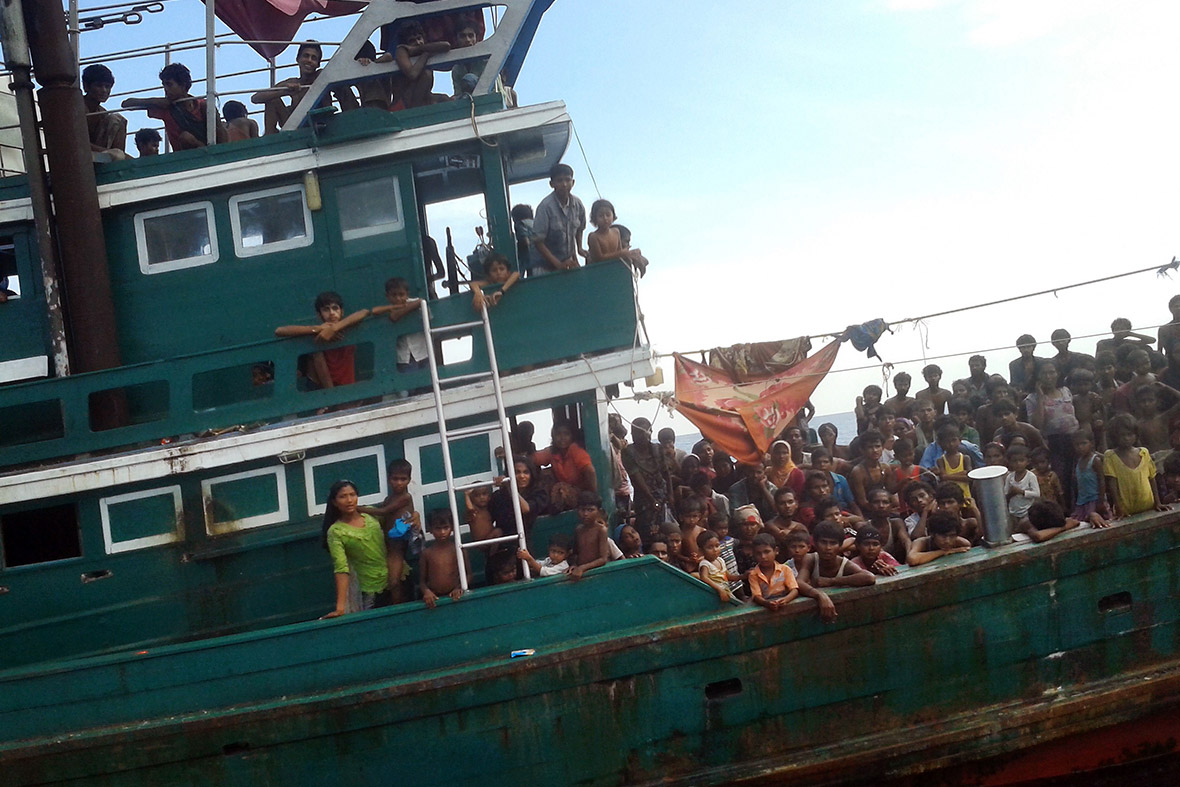Human Rights at the Bottom of the Andaman Sea
By Burma Partnership • May 18, 2015 Earlier this week, two boats containing 600 refugees from Burma – mainly Muslim Rohingya – were turned away from the shores of Malaysia, having fled oppression under the Burma Government. They had been at sea for over two months and faced severe dehydration, starvation, and sickness. According to the International Office for Migration, there may be up to 8,000 still stranded at sea, many of whom will perish unless the international community provides urgent and substantive support. The scale of the exodus from Burma is alarming; according to the UN, this year alone more than 25,000 refugees have left Burma and Bangladesh for the shores of Thailand, Indonesia and Malaysia.
Earlier this week, two boats containing 600 refugees from Burma – mainly Muslim Rohingya – were turned away from the shores of Malaysia, having fled oppression under the Burma Government. They had been at sea for over two months and faced severe dehydration, starvation, and sickness. According to the International Office for Migration, there may be up to 8,000 still stranded at sea, many of whom will perish unless the international community provides urgent and substantive support. The scale of the exodus from Burma is alarming; according to the UN, this year alone more than 25,000 refugees have left Burma and Bangladesh for the shores of Thailand, Indonesia and Malaysia.
Many have been identified as Rohingya, Burma’s most persecuted religious minority population. For decades, the Rohingya have been systematically denied citizenship by their oppressive, military-backed government and subjected to repressive and discriminatory legislation, widespread and systematic human rights abuses, and violence that Human Rights Watch has classified as ethnic cleansing. Since 2012, hundreds have died and more than 140,000 have been displaced from their homes and villages. At the very least, the Burma authorities have been criminally negligent as regards the Rohingya; in many cases they were reportedly complicit in the violence. The Burma Government has shown no willingness to even investigate the violence, let alone prosecute those responsible.
Over 100,000 internally displaced Rohingya are currently confined to camps in Burma and are prohibited from accessing basic health, education, water and sanitation. Civil and political rights are also quickly backsliding. On 1 April of this year, the Burma Government formally scrapped the White Card – the last official means of identification available to the Rohingya – eliminating their ability to vote in the upcoming general election in November. Citizenship will ultimately be based on the discriminatory 1982 Citizenship Law, for which it is expected up to 90% of Rohingya will not qualify.
The conditions faced by the Rohingya in Burma are horrific, and explains why thousands each month risk a lengthy, dangerous journey to other Southeast Asian nations. On 1 May, at least 30 bodies, believed to be Rohingya, were discovered in a human trafficking camp on the Thailand-Malaysia border. The deaths occurred as a result of starvation and disease while in the hands of nefarious human traffickers looking to exploit the refugees’ misery and vulnerability in exchange for hefty ransoms. Although the Thai government has recently beefed up security around traditional overland trafficking routes in an attempt to disrupt them, refugees are now so desperate that they are risking an even more dangerous journey across the Andaman Sea.
Once in Thailand or Malaysia, it is not uncommon for refugees to be subjected to a variety of abuses, including being treated as “illegal immigrants.” The result is often immediate deportation back to Burma or detention in an overcrowded immigration detention center, where families are frequently split up for indefinite periods.
Instead, refugees – who qualify as such under the 1951 UN Refugee Convention (the Convention) – should be immediately informed of the right to seek asylum, and the UN Refugee Agency (UNHCR) should be allowed unhindered access to them in order to provide full protection and to process any asylum applications. Furthermore, neighboring ASEAN countries must stop forcing vulnerable refugees back to sea. Whether or not such countries have signed the Convention, they are nonetheless bound under customary international law to abide by the principle of non-refoulement. In other words, States are obliged not to deport people who have the right to be recognized as refugees – generally those likely to face persecution in their home country.
The Rohingya crisis, simmering for decades before exploding in 2012, has evidently now mushroomed into an urgent regional humanitarian crisis, which will require regional cooperation and collaboration. Unfortunately, the Burma Government does not appear willing to engage with the ASEAN community, refusing to attend a Thai-led meeting on 29 May, and instead accusing Thailand of diverting attention away from the issue of people smuggling.
Yet the current crisis undoubtedly has its origins in the harsh, discriminatory policies of the Burma Government. Regardless of whether other ASEAN countries do their bit, there will be no long-term solution to the crisis without the Burma Government directly addressing the root causes and adopting a positive policy to respect and protect the human rights of the Rohingya rather than persecute them. Influential voices – both within the country and the international community – should be doing their utmost to ensure that the Burma Government honors its legal and moral obligations. And any government claims to political reforms will ring hollow if boatloads of its people are dying at sea.
Tags: 1982 Citizenship Law, ASEAN, Burma Partnership, Refugees, Rohingya, Trafficking, UN High Commissioner for Refugees, UN Refugee ConventionThis post is in: Blog
Related PostsInternational Religious Freedom Report for 2015
International Law on Minorities’ Right to Self-Identify
Report of the United Nations High Commissioner for Human Rights: Situation of human rights of Rohingya Muslims and other minorities in Myanmar
Burma Government Must Heed US Stance on Rohingya
NLD Government Must Protect Rohingya People









 All posts
All posts